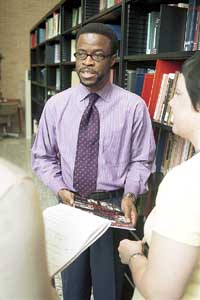Waldo Johnson Jr., Assistant Professor in SSA
By Josh SchonwaldNews Office
 Waldo Johnson Jr. |
Waldo Johnson Jr. teaches classes that many students at the School of Social Service Administration approach with some trepidation.
Most students do not choose social work because they are interested in policy analysis, said Johnson, Assistant Professor and recipient of this year’s SSA Award for Excellence in Teaching. Johnson, who has taught social policy and social science research methods at Chicago for the past six years said, “Most students come to SSA because they want to go out and help people.”
But helping people––through clinical or administrative work––is only one part of a complete social work education, said Johnson. At SSA, where the courses he teaches are required foundation classes, there is, Johnson said, a fundamental philosophy: “a good clinician needs to understand policy. And a good policy person understands the clinical side.”
Johnson teaches the policy side. “I want them to be enlightened consumers and producers of social science research,” he said.
Johnson’s first step as an instructor is to “get a sense of where my students are coming from.” This means more than finding out whether they are psychology or history majors. For instance, at the beginning of each term, Johnson wants to know what impressions his students in his social intervention class have of the poor. In his Theory and Research on the Role of Fathers class, he wants to know about their perceptions of fathers. “I need to know about their personal experiences.”
After culling his students’ perspectives, he said he then can begin to teach them how to approach the research readings––and ultimately to “think critically about social policy.” Thinking critically about social policy requires a skill-set. For one, students have to look at their own experiences skeptically. “Anecdotal experience is not necessarily universally correct,” Johnson said, “yet it informs our reading of research findings and public policy.” It leads them to ask such questions as: “Does poverty policy make sense? Does it make sense within the current political environment?”
Johnson wants his class to spur debate. “I don’t care whether I agree with their point or not, whether its liberal or conservative. I want them to agree to disagree.”
Johnson was on his way to law school when he took the class Foundations of Education as a senior at Mercer University in Georgia. The class, he said, and the book Those Who Can ... Teach really changed his attitude about teaching. Johnson scrapped his law school plan and worked as a kindergarten teacher prior to getting his master’s and doctoral degrees in social work.
His own research focuses on such topics as father involvement among unwed fathers, male involvement in adolescent pregnancy prevention, the use of qualitative research methods in policy development and the mental health status of African-American families.
![[Chronicle]](/images/small-header.gif)